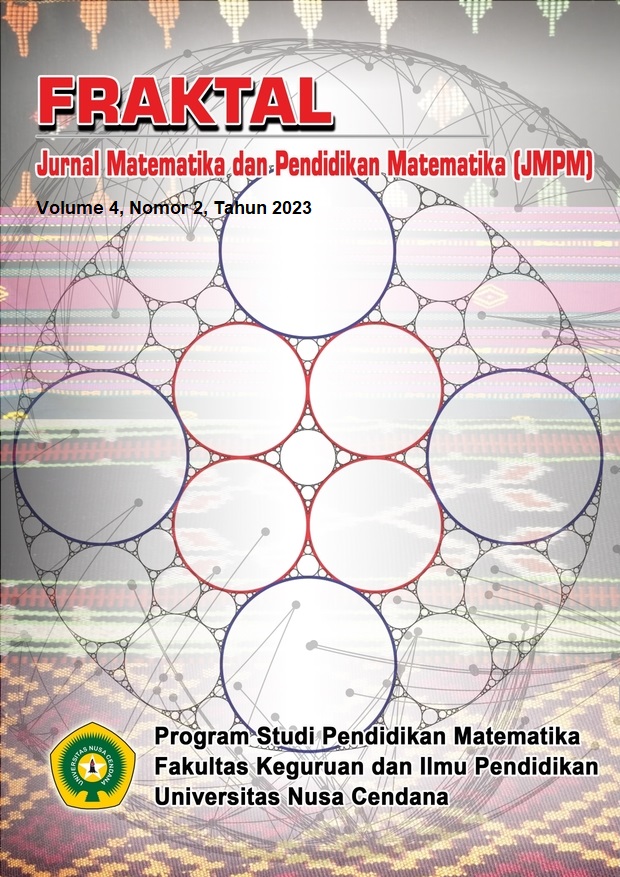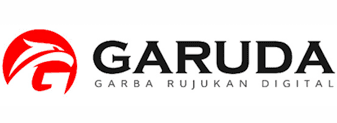Simulasi Kemampuan Koneksi Kesalah Kode Kuasi Siklik Diperumum-LDPC Pada Channel Biner Simetris
Abstract
Low Density Parity Check code or abbreviated as LDPC is a linear error correcting that is used to maintain the integrity of the data. This code is known to have error-correcting capabilities that are close to the maximum theoretical error-correction limit. LDPC code can be made efficient by hybridizing with generalized quasi-cyclic code. Quasi-cyclic codes are generalizations of cyclic codes. The error correction capability of this generalized quasi-cyclic code-LDPC is closely related to the decoding algorithm chosen for the LDPC code. The algorithm used in this research is the Log-Likelihood Ratio Sum-Product Algorithm or abbreviated as LLR-SPA. In this research, simulation of quasi-cyclic code error correction capability in general-LDPC is given on a symmetric binary channel. The main objective of this research is the maximum number of errors that can be corrected by a generalized quasi-cyclic code-LDPC on a symmetric binary channel. Based on the simulation, the main result is that the greater the number of errors added, the smaller the possibility of the message being received in its entirety.
Downloads
References
Baldi, M. (2014). QC-LDPC Code-Based Cryptography. Ancona: University Politecnica delle Marche.
Baldi, M., & Chiaraluce, F. (2007). Quasy-Cyclic Low-Density Parity-Check Codes in the McEliece Cryptosystem. Ancona: University Politecnica delle Marche.
Bhavsar, N.P., & Vala, B. (2014). Design of Hard and Soft Decision Decoding Algorithms of LDPC. International Journal of Computer Applications (0975-8887), 90(16), 10-15. Vadodara: Parul Institute of Engineering & Technology.
Hidayat, M. I., Irwansyah, I., & Wardhana, I. (2022, December). A construction of generalized quasi-cyclic codes over finite field using gray map. In AIP Conference Proceedings (Vol. 2641, No. 1). AIP Publishing.
Hu, Xiao-Yu, Eleftheriou, E., Arnold, Dieter–Michael, & Dholakia, A. (2001). Efficient Implementations of the Sum-Product Algorithm for Decoding LDPC Codes. Global Telecommunications Conference, 2(1), 1036-1036E. Switzerland: IBM Research, Zurich Reseach Laboratory.
Irwansyah, Muchtadi-Alamsyah, I., & Yuliawan, F. (2018). Permutation LDPC Codes in McEliece Cryptosystem. Proceedings Of the 8th SEAMS-UGM Intenational Conference On Mathematics and Its Applications, 1-6. Mataram: Universitas Mataram.
Irwansyah, Muchtadi-Alamsyah, I., & Yuliawan, F. (2019, December). Permutation LDPC codes in McEliece cryptosystem. In AIP Conference Proceedings (Vol. 2192, No. 1, p. 040005). AIP Publishing LLC.
Ling, S., & Xing, C. (2004). Coding Theory a First Course. New York: Cambridge University Press.
Muchtadi-Alamsyah, I., Irwansyah, & Barra, A. (2022). Generalized Quasi-Cyclic Codes with Arbitrary Block Lengths. Bulletin of the Malaysian Mathematical Sciences Society, 45(3), 1383-1407.
Muchtadi-Alamsyah, I., & Irwansyah, I. (2019, December). Asymmetric quantum codes from skew cyclic codes over B1. In AIP Conference Proceedings (Vol. 2192, No. 1). AIP Publishing.
Nasution A.S., dkk. (2011). Penggunaan Teknik Pengkodean Low Density Parity Check pada Data Satelit Penginderaan Jauh. Bandung: STT Telkom Bandung.
Skjaerbaek, T.H. (2010). Quasi-Cyclic Codes. Aalborg: Aalborg University, Department of Mathematical Sciences.
Vanstone, S.A., & Oorschot, P.C. (1989). An Introduction to Error Correcting Codes with Applications. London: Kluwer Academic Publishers.
Copyright (c) 2023 FRAKTAL: JURNAL MATEMATIKA DAN PENDIDIKAN MATEMATIKA

This work is licensed under a Creative Commons Attribution-NonCommercial-ShareAlike 4.0 International License.
- Hak publikasi atas semua materi naskah jurnal yang diterbitkan/dipublikasikan dalam situs E-Journal Fraktal ini dipegang oleh dewan redaksi dengan sepengetahuan penulis (hak moral tetap milik penulis naskah).
- Ketentuan legal formal untuk akses artikel digital jurnal elektronik ini tunduk pada ketentuan lisensi Creative Commons Attribution-ShareAlike (CC BY-SA), yang berarti Jurnal Fraktal berhak menyimpan, mengalih media/format-kan, mengelola dalam bentuk pangkalan data (database), merawat, dan mempublikasikan artikel tanpa meminta izin dari Penulis selama tetap mencantumkan nama Penulis sebagai pemilik Hak Cipta.
- Naskah yang diterbitkan/dipublikasikan secara cetak dan elektronik bersifat open access untuk tujuan pendidikan, penelitian, dan perpustakaan. Selain tujuan tersebut, dewan redaksi tidak bertanggung jawab atas pelanggaran terhadap hukum hak cipta.

 Muhammad Sukriadi(1*)
Muhammad Sukriadi(1*)










